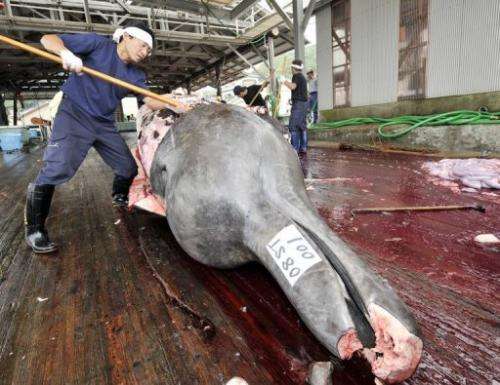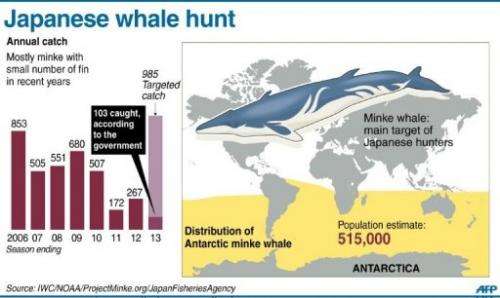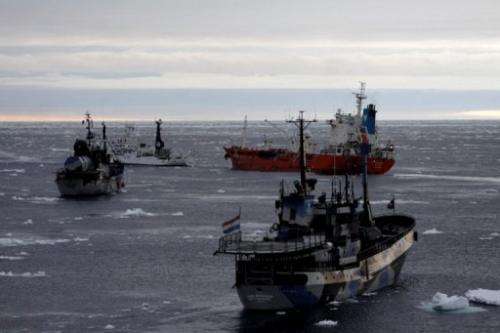Japan whaling haul at 'record low'

The haul from Japan's whaling mission in the Southern Ocean was a "record low" this year, a government minister said, blaming "unforgivable sabotage" by activists.
The hunt netted just 103 Antarctic minke whales, less than half its tally last year, and no fin whales, Agriculture, Forestry and Fisheries Minister Yoshimasa Hayashi said, adding it was the lowest total since "research whaling" began in 1987.
The fleet, which was again harassed by militant environmentalist group Sea Shepherd, is due to arrive back in Japan over the next few days, Hayashi told a press conference.
During the 48-day-long whaling expedition, campaigners—labelled "pirates" earlier this year by a US judge—disrupted the hunt four times and the Japanese ships spent 21 days avoiding their vessels, the Fisheries Agency said.
Sea Shepherd committed "unforgivable sabotage", Hayashi said, according to Kyodo News, including a collision with a whaling vessel as it was being refuelled.
"We will seek more support from other countries to conduct research whaling in a stable manner," the minister said.
Japan's annual whale hunt has long drawn criticism from activists and foreign governments, but Tokyo defends the practice saying eating whale is part of the country's culinary tradition.
Captured whales, later sold as food, are studied as part of a bid by Japan's whaling research institute to prove their populations can sustain commercial whaling. Activists charge Tokyo uses the loophole to get around an international ban on hunting.

Norway and Iceland are the only nations that hunt whales in open defiance of a 1986 moratorium on commercial whaling.
Japan's whaling fleet left port in December aiming to catch about 1,000 whales.
Sea Shepherd, whose founder Paul Watson is an international fugitive, has doggedly pursued the whaling fleet and makes no secret of the fact it employs highly confrontational tactics.
The organisation's ships Steve Irwin, Bob Barker and Sam Simon returned from their campaign this year with an estimated Aus$1.0 million (US$1.03 million) damage bill after run-ins with Japanese whalers.
Their fourth ship, the Brigitte Bardot, was at an undisclosed location with Watson, wanted by Interpol after skipping bail last July in Germany, thought to be on board.
The two sides have in the past clashed violently in exchanges that have seen stink bombs thrown at Japanese crew and water jets trained on protesters.
The bitter fight has also reached the legal arena with both sides filing lawsuits against the other.

Last month Sea Shepherd filed a lawsuit in the Netherlands against the crew of Japanese whaling ship Nisshin Maru alleging piracy and attempted manslaughter after they clashed in the Antarctic Ocean in February.
Japan's Institute for Cetacean Research has in turn accused Sea Shepherd boats of ramming the Nisshin Maru.
In a colourful pronouncement, a US appeals court in February labelled Sea Shepherd "pirates", overturning a lower court's ruling against Japanese whalers.
The same court in December ordered Sea Shepherd to maintain a distance of 500 metres (yards) from Japanese whaling ships.
Questions remain about the economic viability of whaling given the decades-long decline in Japanese consumption of the meat.
A report by the International Fund for Animal Welfare recently said the whaling programme costs Japanese taxpayers $10 million a year.
However, the Fisheries minister Hayashi told AFP in an interview earlier this year that the hunt would continue, dismissing anti-whaling voices as "a cultural attack, a kind of prejudice against Japanese culture".
(c) 2013 AFP



















